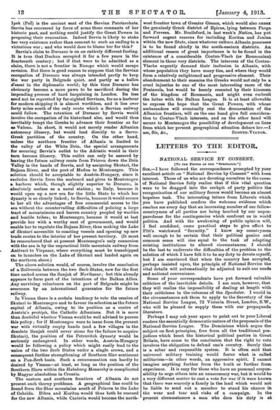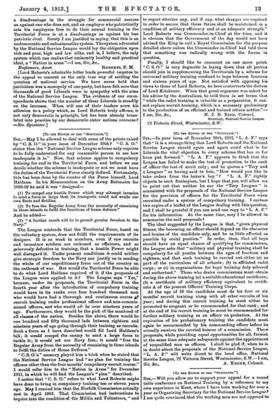LETTERS TO THE EDITOR.
NATIONAL SERVICE BY CONSENT.
[To THE EDITOR OF THE "SPECTATOR."] SIB,—I have followed the correspondence prompted by your excellent article on "National Service by Consent" with keen interest. Those of us who are devoting ourselves to the cause of National Service fully realize that if this vital question were to be dragged into the cockpit of party polities the reorganization of our military forces would become an almost hopeless task. The interesting letters from Liberals which you have published confirm the welcome evidence which reaches me every day that an increasing number of our fellow. countrymen of all parties are being touched by our unpre- paredness for the contingencies which confront us in world politics. And with the awakening of public opinion will, I feel confident, come practical steps to give effect to Pitt's watchword "Security." I know my countrymen well enough to be certain that their political genius and common sense will rise equal to the task of adapting existing institutions to altered circumstances. I should be the last to underrate the difficulties of the problem to the solution of which I have felt it to be my duty to devote myself, but I am convinced that when the country has accepted, perhaps insisted upon, the principle of National Service the vital details will automatically be adjusted to suit our needs and national convenience.
Some of your correspondents have put forward valuable criticism of the inevitable details. I am sure, however, that they will realize the impossibility of dealing at length with their criticisms in the columns of the Spectator. I would in the circumstances ask them to apply to the Secretary of the National Service League, 72 Victoria Street, London, S.W., who will be pleased to supply them with our propaganda literature.
Perhaps I may ask your space to point out to your Liberal readers the essentially democratic nature of the proposals of the National Service League. The Dominions which argue the subject on first principles, free from all the traditional pre- judices which beset the historical political parties in Great Britain, have come to the conclusion that the right to vote involves the obligation to defend one's country. Surely that is a sober and responsible system. It is often said that universal military training would foster what is called militarism—in other words, an aggressive spirit. I cannot imagine anything further from the truth or further from experience. It is easy for those who have no personal respon- sibility to urge others into an unnecessary war, but it would be a very different matter to cast a vote for war if it were known that there was scarcely a family in the land which would not be liable to send out a member to stand his chance in the wear and tear and risks of a campaign. In the present circumstances a man who does his duty is at
a disadvantage in the struggle for commercial success as against one who does not, and an employer who patriotically sets his employees free to do their annual training in the Territorial Force is at a disadvantage as against his less patriotic rivaL Surely I am justified in saying that this is an undemocratic and unbusinesslike system. The system advocated by the National Service League would lay the obligation upon rich and poor, high and low alike, and is, I believe, the only system which can realize that eminently healthy and practical ideal, a "Nation in arms."—I am, Sir, (km,
[Lord Roberts's admirable letter lends powerful impetus to the appeal to consent as the only true way of settling the question of national service. We have never held that patriotism was a monopoly of one party, but have felt sure that thousands of good Liberals were in sympathy with the aims of the National Service League. The evidence of our corre- spondents shows that the number of these Liberals is steadily on the increase. When will one of their leaders avow his adhesion to a policy which, as Lord Roberts truly affirms, is not only democratic in principle, but has been already trans- lated into practice by our democratic sister nations overseas ? —ED. Spectator.]























































 Previous page
Previous page